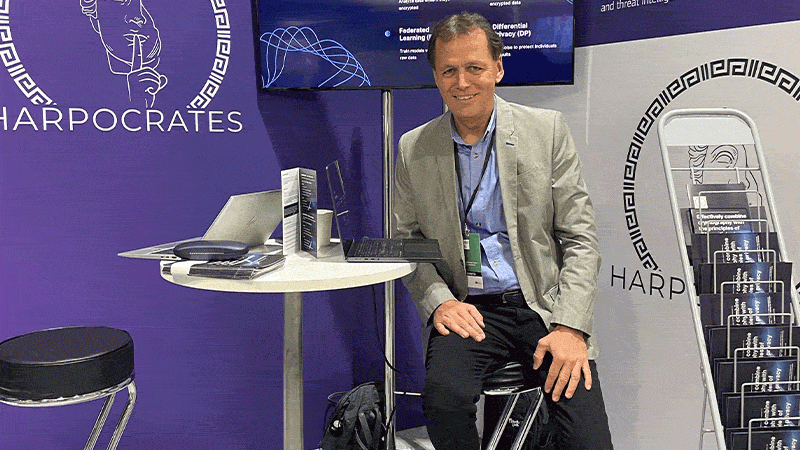Professor Tamas Kiss, Professor of Distributed Computing at the University of Westminster’s School of Computer Science and Engineering, recently attended the European Security Research Event (SRE) in Warsaw, Poland, to showcase his project on privacy-preserving machine learning techniques to Magnus Brunner, the European Union (EU) Commissioner for Internal Affairs and Migration.

The SRE is a forum where industry, policy makers, safety and security practitioners, knowledge institutions and essential service providers discuss security threats and challenges. Together they explore how EU research and innovation can contribute to tackle them, with this year’s theme focusing on boosting security through EU-based innovation.
At the event, which took place between 24-25 June, Professor Kiss showcased his project Harpocrates to Magnus Brunner and his team, where they learnt about the potentials of privacy preserving machine learning.
Harpocrates is a three-year long research project funded by the European Commission and UK Research and Innovation (UKRI). Professor Kiss acts as the Scientific Coordinator of the project that develops new privacy preserving machine learning techniques.
The project is motivated by the need to share data between multiple organisations, such as hospitals or local authorities, and using this data to train and run Artificial Intelligence (AI), data analytics and machine learning applications. However, as some parts of this data are sensitive, like patient information, it cannot be shared between multiple institutions, especially in different countries.
Harpocrates helps tackle this by encrypting the data where it was generated. After that point, the data remains encrypted and safe throughout the entire process. All computations and machine learning operations are performed on this encrypted data, without ever exposing confidential information.
In one case, three hospitals from Germany, France and Finland are collecting biological signals such as recordings of the brain's electrical activity, videos and blood saturation levels from patients during their sleep. The data, coming from multiple sources, is encrypted and shared with researchers to build more accurate diagnostic models for sleep disorders. By applying Harpocrates technologies, the data is never decrypted, keeping all sensitive information safe and still allowing it to be used to perform complex calculations.
Tamas Kiss said: “Presenting Harpocrates to Commissioner Brunner was a great opportunity to highlight our excellent results and raise his attention to the need of changes in policies and legislations to enable secure and responsible data sharing using advanced technologies.”
Professor Tamas Kiss’s project directly contributes to the United Nations Sustainable Development Goal (SDGs) 9: Industry, Innovation and Infrastructure. Since 2019, the University of Westminster has used the SDGs holistically to frame strategic decisions to help students and colleagues fulfil their potential and contribute to a more sustainable, equitable and healthier society.
Find out more about the School of Computer Science and Engineering at Westminster.





